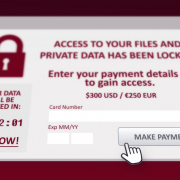5 cybersecurity basics every one of your employees should know
In recent years, hackers have started focusing more of their attacks on SMBs. Often, smaller businesses just don’t have the robust cybersecurity tools larger companies have. In fact, 90 percent of small businesses don’t protect their data at all.
Luckily, you don’t have to spend a lot of money to protect your business and clients. Follow these five basic cybersecurity tips to follow along the path to a better you.
Use strong passwords
Using strong passwords for all of your company’s devices, accounts and sensitive files will make it considerably harder for unauthorized users to access your data. A strong password should include:
- A mixture of uppercase and lowercase characters
- Symbols like %, & and @
- Numbers
If you aren’t certain how to create strong passwords, you can use a secure password generator to get a random sequence of characters, numbers and symbols.
Make sure every device that connects to your network uses strong passwords. That includes mobile devices like smartphones and tablets that your employees might use to access files and apps.
Secure your company’s Wi-Fi
Even if you don’t have much experience with cybersecurity, you can take a few steps to secure your company’s Wi-Fi. Some simple ways to improve your Wi-Fi network’s security include:
- Using a network name that’s unrelated to your business
- Placing your network router in a secure location
- Choosing a random password
These steps won’t give you perfect network security, but they will give you enough protection that hackers will probably decide to focus on easier targets.
Have a data loss prevention strategy
In 2016, data breaches gave hackers access to more than 1.37 million private records that contained information like Social Security numbers, credit card numbers and addresses. If a hacker manages to infiltrate your network, they can steal information to commit identity fraud against your customers. As a result, you could lose customers and tarnish your business’s reputation.
Having a data loss prevention strategy is essential to protecting your business and customers. If you don’t have IT staff members experienced in data loss prevention, then you should outsource this project to a reliable company that can help you.
Learn about the most recent scams
Cybercriminals keep changing their strategies so they can try to stay ahead of the latest security tools. Staying updated about the most recent scams will help you avoid tactics that put your company at risk. Some of the most recent scams include:
- Social engineering that attempts to get sensitive information from employees.
- Spear phishing that uses professional-looking emails to trick people into clicking links that install malware
- Ransomware that holds your information hostage until you pay the criminals to decrypt your files
If you’re not sure whether your employees have the right training to recognize these scams, then you can use penetration testing to see whether or not they fall for the strategies.
Keep your software and operating systems updated
Hackers investigate operating systems and software to find security holes that will let them infiltrate networks. As the hackers discover these vulnerabilities, software developers release patches that prevent them from taking advantage of the flaws.
Always install the latest updates for your company’s operating systems and applications. If you don’t update them all, then a hacker may find a way into your system.
SMB owners can do a lot to improve their cybersecurity efforts. Unfortunately, your efforts probably won’t keep out the most tenacious cybercriminals. Hiring an IT consultant will give you a higher level of cybersecurity so you don’t have to worry about whether your data is in jeopardy.










